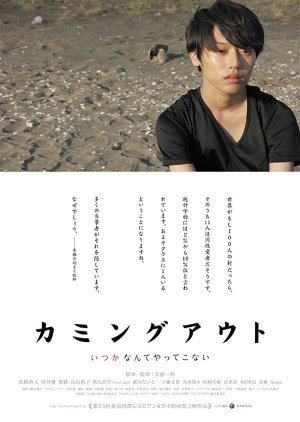
Cette critique peut contenir des spoilers
I wanted to like this more than I did. The main problem is that the story has been told so many times, in so many other movies and TV shows. There are a lot of long pauses between lines of dialog. It makes many of the scenes drag and in a few cases allowed me enough time to say out loud what the next line would be. I was right about 3/4 of the time, which should tell you how predictable the script is.
I didn't care for a scene where it looks as though the ML is going to kill himself. It turns out that he doesn't, but we never learn if he never actually intended to commit suicide or if he changed his mind about going through with it. I think the answer is important to our understanding of the character.
The acting is generally excellent and there's really nothing else to fault with this production. It's just a little too much of a re-tread, which makes its slow pace feel even slower, and even though the ML's "coming out" is ultimately successful there's still something a little joyless about the outcome.
Cet avis était-il utile?

Underrated
Such an underrated movie for me. The rating should be higher. There's many lessons that can be taken from this movie.Story :
I'm getting emotional when watching this movie. Usually this kind of story will be having a tragic ending. But I'm glad it doesn't have it. Thank you writer-nim. ^^
Acting/Casting :
The casting was pretty good. It match with the character. And I haven't complain about their acting.
Music :
Soundtrack at the ending was good.
Overall 8.9/10 :)
Cet avis était-il utile?

Myslel jsem, že to bude takový solidní šedavý průměr a tak tomu zezačátkui bylo. Nakonec se z toho vyklubal příběh poutavý (někdo napíše klišé, stokrát ohrané téma) a já začal postavě Yo věřit a celé mě to do příběhu vtáhlo. Z uzavřeného a bázlivého kluka se najednou stal mladý muž uvědomělý, který si začíná sám sobe vážit. Příjemný zážitek podpořený velmi sympatickou postavou spolužáka Nobora. Myslím že těm, kteří mohou sledovat japonské filmy, mohu tento snímek doporučit.
Cet avis était-il utile?

A moving look at the challenges and triumphs that accompany coming out
There are films that seem to be built more from emotion than from reason and that, by making a virtue of necessity, are capable of crossing borders and penetrating the depths of the heart. 'Coming Out' ('Kamingu Auto', its original name in Japanese), is clearly one of those films.The tenderness and care with which this raw story of a homosexual university student who hides his homosexuality and decides to come out of the closet to his family and friends, in addition to confessing his love to Noburo, his best friend, is treated from the first moment, supplements any possible technical or artistic deficiency.
In the end, within this story, the issue of homosexuality appears almost as a footnote and what is really underlined is that what matters is that LOVE will always remain LOVE, and no one can break that.
So anyone who tries to approach this film in search of morbidity and bait may already forget about the subject. The only thing we find here is a beautiful love story full of meaning and loaded with sensitivity.
Ang Lee had already warned us in another story that took place at the foot of the Brokeback mountains. Being oneself and loving fully becomes practically impossible when desire comes face to face with the wall of the laws of an unjust society that decides in advance what is good and what is not. Laws solely based on prejudices that use any shortcut – homosexuality, for example – to condemn what is not considered correct. A society that prejudges and takes the behavior of others so lightly can only be a sick society. Those who have suffered it in some way and in a similar situation know that a story like this could only be born from the viscera and woven with the threads of pure emotion.
In his debut as a screenwriter and director, japanese filmmaker Inudo Kazutoshi ('Crack', 2015) weaves a story in which Akami Yo, an ordinary homosexual college student who enjoys spending time with his friends, has decided to come out of the closet.
Given the insistence of his family and friends to introduce him to his girlfriend, or the demands of when he is going to get married and have children, the protagonist decides to communicate his sexual orientation to the people around him and who are important in his life, after having accepted herself with that orientation.
The film explores what is perhaps one of the most complicated and at the same time most satisfying decisions in the life of every homosexual. Tired of living pretending to be someone else and, despite feeling afraid of being rejected by others, the boy has decided to take the step, within a conservative family, a heteronormative and patriarchal country that does not recognize marriage between people of the same sex and with high levels of homophobia.
'Coming Out' is a drama with no more pretensions than those indicated in its premise, and it is clear that the director and screenwriter intends to highlight the general attitude of society regarding the issues of the Japanese LGBT community. In that sense, it seems very educational and almost preachy at times, but the purposes of making a film like this in a country like Japan is understandable.
I find the part where Yo talks to his parents the most intriguing and I can imagine that many viewers will be able to identify with it. It's a little cheesy to be brutally honest, but I find it endearing.
First he will talk to his sister because he may feel more comfortable addressing the topic with her, then with his parents and finally with Noburo, who in addition to being his best friend is the boy he likes.
The only ones who know Yo's secret are Tsuyoshi and Madame, two gay employees of the "Bb" bar where he usually goes, and a girl who frequents the same, who will encourage him to come out of the closet.
Despite its seemingly trite theme, this film tells the story honestly by showing the harsh reality of a world in which people hate or fear those who are different. For a homosexual to fit into Japanese society it seems to be necessary to hide one's true identity and repress what one really is.
Also noteworthy is the performance of the protagonist, Takahashi Naoto ('Tokumei Sentai Go-Busters'), who manages to intensely convey the feelings of a complex character.
The cast is closed by Taiji Utagawa, Fumika Ichinose and Kosuke Akiyama (TooT Aki), who in fact came out of the closet in the Japanese media.
The film was so popular that it was sold out at an advance screening at the 23rd Tokyo International Gay and Lesbian Film Festival.
The viewer may like how the camera closes on the protagonist's face when he confesses to his sister, before moving on to her. Likewise, the split screen color and Yo's internal dialogue.
On the other hand, the film presents organizations and self-teaching material about the lives of LBGTQ+ people and a critique of their media representation, something significant if we take into account that it was filmed in 2014.
Despite being a film with a strong dramatic charge, it gives you the dose of energy, optimism and empowerment necessary to go out into the street and proudly shout what you feel.
The message is not only one of self-acceptance, but also of fighting for our rights, offering a moving look at the challenges and triumphs that accompany coming out and the process of accepting oneself.
Cet avis était-il utile?



































